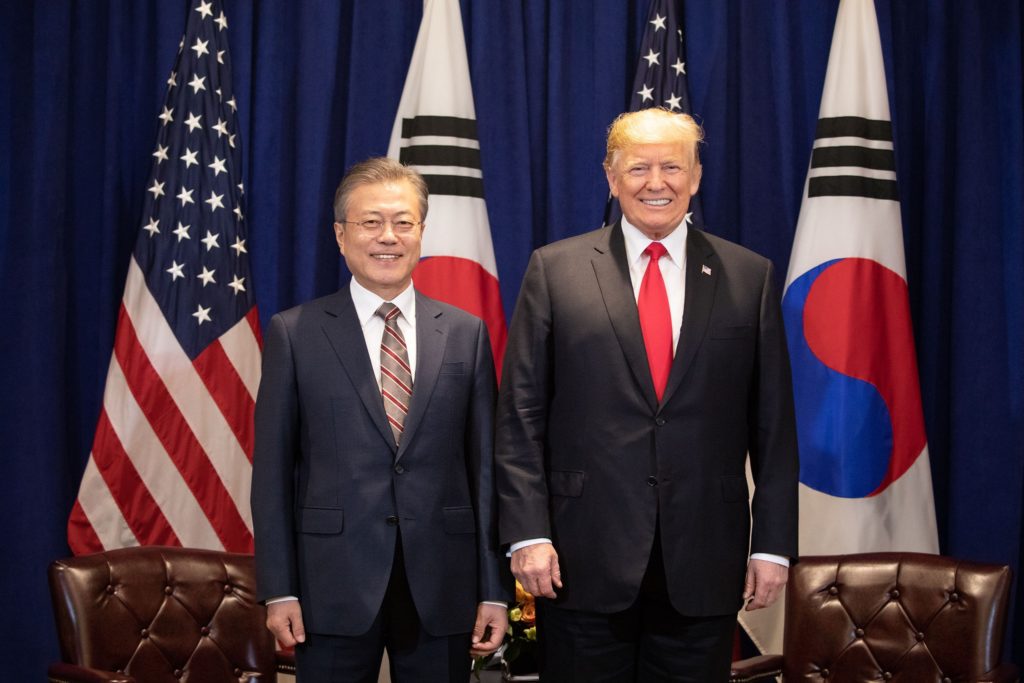The Peninsula
Presidents Trump and Moon at the UNGA: Two Speeches, Two Visions

By Mark Tokola
President Trump and President Moon Jae-in both addressed the United Nations General Assembly this year, the former on September 25 and the latter on September 26. They agreed that enormous progress has been made on the denuclearization of North Korea. They thanked each other for their efforts in negotiating with Kim Jong-un. They both promised that further success is in the offing. Although there were differences in emphasis, with President Moon talking more about steps that need to be taken towards North Korea than did President Trump, the remarks fit together reassuringly well. As has been said for years, it will be very difficult to solve the North Korea problem unless Washington and Seoul work in harmony. However, the non-North Korea parts of the two Presidents’ UNGA speeches were startlingly different. It’s not too much to say that Presidents Trump and Moon have different views of the world.
President Trump championed a doctrine of sovereignty, national interest, and patriotism. According to his theory of international relations, if all nations act in a way that is wholly sovereign and wholly self-interested, the world will be at peace. He said: “We reject the ideology of globalism and we embrace the doctrine of patriotism.” “We believe that when nations respect the rights of their neighbors and defend the interests of their people, they can better work together to security the blessings of safety, prosperity, and peace.” “Sovereign and independent nations are the only vehicle where freedom has ever survived, democracy has ever endured, or peace has ever prospered. And so we must protect our sovereignty and our cherished independence above all.”
Putting his theory into practice, President Trump in his UNGA speech said that the United States would not participate in the multilateral Iran nuclear deal, the UN Human Rights Council, or the International Criminal Court, would not give foreign aid to countries who were not friends of the U.S., and would not engage in international trade except under terms that treat the U.S. fairly. The President expressed his belief that there is a movement afoot to create “global governance,” against which the United States and other responsible nations must defend themselves.
President Moon Jae-in, in a completely different vein, invited the United Nations to share “its experience and wisdom” in helping with current diplomatic efforts towards North Korea and said, “My sincere hope is that the UN’s vision of sustainable development will be realized on the Korean Peninsula.” President Moon looked beyond the denuclearization issue to envision future regional integration in Northeast Asia and pledged that South Korea will honor its international commitments, including to targets set in the Paris Agreement on climate change. Moon pledged 50,000 tons of rice annually, beginning this year, to developing countries that are suffering from severe food crises. He emphasized the need for global approaches to solve problems: “I believe that there needs to be a holistic approach encompassing peace, development and human rights to fundamentally resolve humanitarian crises. The Government of the Republic of Korea will engage in discussions and provide support to ‘make the United Nations relevant to all people.’”
Putting his theory of interdependence and shared sovereignty into practical terms, Moon Jae-in proposed the creation of an “East Asian Railroad Community,” explicitly modelled after the European Coal and Steel Community (ECSC) that was the foundation of the later European Economic Community (EEC) and then the European Union. Following Europe’s model of integration, he said that the East Asian Railroad Community would be followed by “an energy and economic community in East Asia” which could lead to a “multilateral peace and security architecture in Northeast Asia.” It is hard to imagine anything more unlike President Trump’s vision.
There is no reason why the United States under President Trump and South Korea under President Moon cannot cooperate closely and effectively on North Korean denuclearization. They have also successfully modified the Korea-U.S. Free Trade Agreement (KORUS FTA) to their mutual satisfaction and are currently engaged in negotiations regarding funding of their military alliance. Neither Donald Trump nor Moon Jae-in are likely, however, to subscribe to the other’s view of how the world should work.
Mark Tokola is the Vice President of the Korea Economic Institute of America. The views expressed here are his own.
Photo from the White House’s photostream on flickr Creative Commons.
